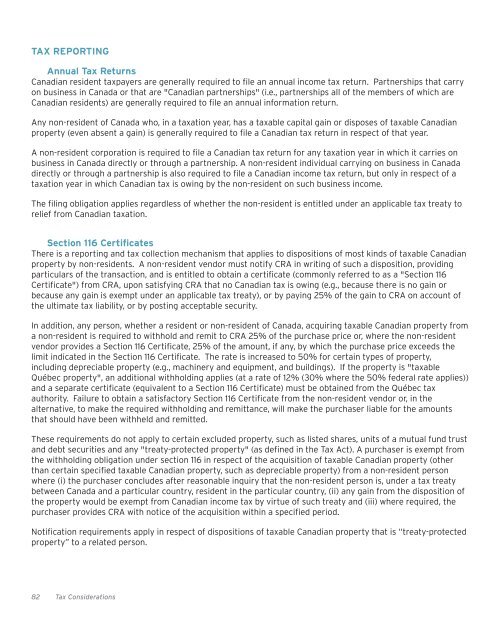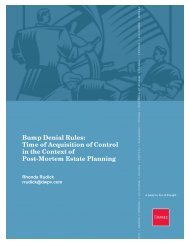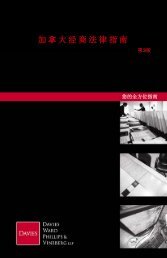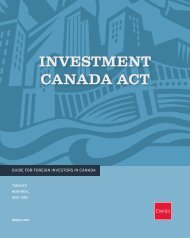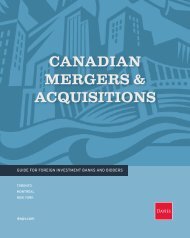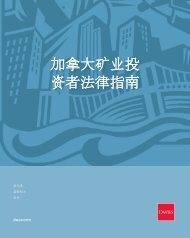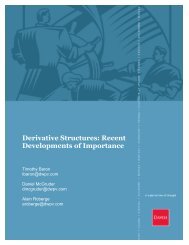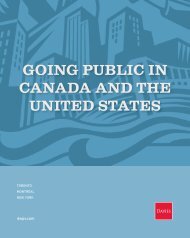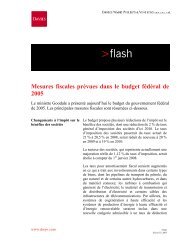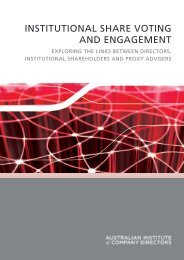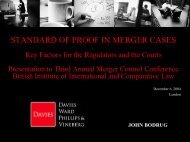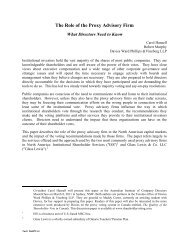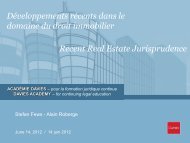• real property situated <strong>in</strong> Canada;• assets used <strong>in</strong> a <strong>bus<strong>in</strong>ess</strong> carried on <strong>in</strong> Canada;• a share of a private corporation, an <strong>in</strong>terest <strong>in</strong> a trust or an <strong>in</strong>terest <strong>in</strong> a partnership more than 50% ofthe value of which was derived from real or immovable property situated <strong>in</strong> Canada, Canadian resourceproperty, or timber resource property at any time <strong>in</strong> the 60 month period prior to the disposition ofsuch shares or other <strong>in</strong>terests; and• units of a mutual fund trust and listed shares of a corporation, where at any time dur<strong>in</strong>g the 60-monthperiod preced<strong>in</strong>g the disposition, a 25% ownership threshold is exceeded and more than 50% of thevalue of the units or shares was derived from real or immovable property situated <strong>in</strong> Canada, Canadianresource property, or timber resource property.Prior to March 4, 2010, the def<strong>in</strong>ition of taxable Canadian property <strong>in</strong>cluded all shares of a private Canadiancorporation, regardless of the nature of the corporation's assets. The Government of Québec, which is the onlyCanadian prov<strong>in</strong>ce with similar rules, announced its <strong>in</strong>tention to harmonize the def<strong>in</strong>ition of taxable Québecproperty accord<strong>in</strong>gly.DETERMINATION OF CANADIAN RESIDENCEThe term "resident <strong>in</strong> Canada" is not def<strong>in</strong>ed <strong>in</strong> the Tax Act but <strong>in</strong>stead a person's residence is determ<strong>in</strong>ed bycommon law criteria. However, there are some specific deem<strong>in</strong>g rules <strong>in</strong> the Tax Act that deem certa<strong>in</strong> personsto be either resident or not resident <strong>in</strong> Canada for purposes of the Tax Act.A corporation <strong>in</strong>corporated <strong>in</strong> Canada after April 26, 1965 (or, <strong>in</strong> certa<strong>in</strong> limited situations, before this date) isdeemed to be resident <strong>in</strong> Canada.There is no statutory rule that deems a corporation <strong>in</strong>corporated outside Canada to be resident <strong>in</strong> Canada.Under the common law test of residence, a corporation will be considered to be resident <strong>in</strong> Canada if its centralmanagement and control is located <strong>in</strong> Canada. Central management and control is generally considered to referto the superior or direct<strong>in</strong>g decision-mak<strong>in</strong>g <strong>in</strong> respect of a corporation that is normally exercised by its board ofdirectors. As a result, the place where the board of directors exercises its decision-mak<strong>in</strong>g powers will generallybe the place <strong>in</strong> which the central management and control of the corporation is located.In the case of an <strong>in</strong>dividual, the courts have generally held that residence is determ<strong>in</strong>ed on the basis of thedegree to which an <strong>in</strong>dividual "settles <strong>in</strong>to or ma<strong>in</strong>ta<strong>in</strong>s" his or her ord<strong>in</strong>ary mode of liv<strong>in</strong>g at the place <strong>in</strong>question. In addition, an <strong>in</strong>dividual will be regarded as establish<strong>in</strong>g Canadian residency if he or she is ord<strong>in</strong>arilyresident <strong>in</strong> Canada. The determ<strong>in</strong>ation of whether an <strong>in</strong>dividual is ord<strong>in</strong>arily resident <strong>in</strong> Canada depends onwhether Canada is the place where the <strong>in</strong>dividual, <strong>in</strong> the settled rout<strong>in</strong>e of his or her life, regularly, normally orcustomarily lives. In addition, the Tax Act deems an <strong>in</strong>dividual who "sojourns" <strong>in</strong> Canada for 183 or more daysdur<strong>in</strong>g a year to be resident <strong>in</strong> Canada throughout that year.In general, a trust will be resident <strong>in</strong> Canada for <strong>in</strong>come tax purposes where a majority of its trustees areresident <strong>in</strong> Canada. However, a careful exam<strong>in</strong>ation of the facts of each situation, as well as a review of recentjurisprudence, is necessary to help determ<strong>in</strong>e the residency of a trust. In addition, certa<strong>in</strong> non-resident trustswill be deemed to be resident <strong>in</strong> Canada <strong>in</strong> certa<strong>in</strong> circumstances.A taxpayer who is considered under Canadian domestic law to be resident <strong>in</strong> Canada and at the same timeresident <strong>in</strong> another country may be deemed by an applicable tax treaty to be resident <strong>in</strong> only one country for taxpurposes.Tax Considerations 81
TAX REPORTINGAnnual Tax ReturnsCanadian resident taxpayers are generally required to file an annual <strong>in</strong>come tax return. Partnerships that carryon <strong>bus<strong>in</strong>ess</strong> <strong>in</strong> Canada or that are "Canadian partnerships" (i.e., partnerships all of the members of which areCanadian residents) are generally required to file an annual <strong>in</strong>formation return.Any non-resident of Canada who, <strong>in</strong> a taxation year, has a taxable capital ga<strong>in</strong> or disposes of taxable Canadianproperty (even absent a ga<strong>in</strong>) is generally required to file a Canadian tax return <strong>in</strong> respect of that year.A non-resident corporation is required to file a Canadian tax return for any taxation year <strong>in</strong> which it carries on<strong>bus<strong>in</strong>ess</strong> <strong>in</strong> Canada directly or through a partnership. A non-resident <strong>in</strong>dividual carry<strong>in</strong>g on <strong>bus<strong>in</strong>ess</strong> <strong>in</strong> Canadadirectly or through a partnership is also required to file a Canadian <strong>in</strong>come tax return, but only <strong>in</strong> respect of ataxation year <strong>in</strong> which Canadian tax is ow<strong>in</strong>g by the non-resident on such <strong>bus<strong>in</strong>ess</strong> <strong>in</strong>come.The fil<strong>in</strong>g obligation applies regardless of whether the non-resident is entitled under an applicable tax treaty torelief from Canadian taxation.Section 116 CertificatesThere is a report<strong>in</strong>g and tax collection mechanism that applies to dispositions of most k<strong>in</strong>ds of taxable Canadianproperty by non-residents. A non-resident vendor must notify CRA <strong>in</strong> writ<strong>in</strong>g of such a disposition, provid<strong>in</strong>gparticulars of the transaction, and is entitled to obta<strong>in</strong> a certificate (commonly referred to as a "Section 116Certificate") from CRA, upon satisfy<strong>in</strong>g CRA that no Canadian tax is ow<strong>in</strong>g (e.g., because there is no ga<strong>in</strong> orbecause any ga<strong>in</strong> is exempt under an applicable tax treaty), or by pay<strong>in</strong>g 25% of the ga<strong>in</strong> to CRA on account ofthe ultimate tax liability, or by post<strong>in</strong>g acceptable security.In addition, any person, whether a resident or non-resident of Canada, acquir<strong>in</strong>g taxable Canadian property froma non-resident is required to withhold and remit to CRA 25% of the purchase price or, where the non-residentvendor provides a Section 116 Certificate, 25% of the amount, if any, by which the purchase price exceeds thelimit <strong>in</strong>dicated <strong>in</strong> the Section 116 Certificate. The rate is <strong>in</strong>creased to 50% for certa<strong>in</strong> types of property,<strong>in</strong>clud<strong>in</strong>g depreciable property (e.g., mach<strong>in</strong>ery and equipment, and build<strong>in</strong>gs). If the property is "taxableQuébec property", an additional withhold<strong>in</strong>g applies (at a rate of 12% (30% where the 50% federal rate applies))and a separate certificate (equivalent to a Section 116 Certificate) must be obta<strong>in</strong>ed from the Québec taxauthority. Failure to obta<strong>in</strong> a satisfactory Section 116 Certificate from the non-resident vendor or, <strong>in</strong> thealternative, to make the required withhold<strong>in</strong>g and remittance, will make the purchaser liable for the amountsthat should have been withheld and remitted.These requirements do not apply to certa<strong>in</strong> excluded property, such as listed shares, units of a mutual fund trustand debt securities and any "treaty-protected property" (as def<strong>in</strong>ed <strong>in</strong> the Tax Act). A purchaser is exempt fromthe withhold<strong>in</strong>g obligation under section 116 <strong>in</strong> respect of the acquisition of taxable Canadian property (otherthan certa<strong>in</strong> specified taxable Canadian property, such as depreciable property) from a non-resident personwhere (i) the purchaser concludes after reasonable <strong>in</strong>quiry that the non-resident person is, under a tax treatybetween Canada and a particular country, resident <strong>in</strong> the particular country, (ii) any ga<strong>in</strong> from the disposition ofthe property would be exempt from Canadian <strong>in</strong>come tax by virtue of such treaty and (iii) where required, thepurchaser provides CRA with notice of the acquisition with<strong>in</strong> a specified period.Notification requirements apply <strong>in</strong> respect of dispositions of taxable Canadian property that is “treaty-protectedproperty” to a related person.82 Tax Considerations
- Page 1 and 2:
DOING BUSINESSIN CANADAYOUR COMPLET
- Page 3 and 4:
ONTENTSTABLE OF CONTENTSINTRODUCTIO
- Page 5 and 6:
IntroductionPOLITICAL AND CONSTITUT
- Page 7 and 8:
5RealEstateIndustrial and Intellect
- Page 9 and 10:
accordance with directions from the
- Page 11 and 12:
TITLE INSURANCE, TITLE OPINIONS AND
- Page 13 and 14:
11EnvironmentalLawIndustrial and In
- Page 15 and 16:
commercial activities, or carrying
- Page 17 and 18:
The federal government currently re
- Page 19 and 20:
17Types ofBusiness OrganizationIndu
- Page 21 and 22:
provincial law cannot do so as of r
- Page 23 and 24:
partnership, limited partners’ li
- Page 25 and 26:
parties. In Québec, joint venturer
- Page 27 and 28:
25Financing aBusiness OperationIndu
- Page 29 and 30: The Civil Code of Québec provides
- Page 31 and 32: 29CorporateGovernanceIndustrial and
- Page 33 and 34: Instrument 58-101. The practices re
- Page 35 and 36: 33CompetitionLawIndustrial and Inte
- Page 37 and 38: BID-RIGGINGBid rigging is any agree
- Page 39 and 40: anticompetitive agreements among co
- Page 41 and 42: 39ForeignInvestmentIndustrial and I
- Page 43 and 44: apply for Canadian citizenship. (Pe
- Page 45 and 46: (D)GENERAL REVIEW THRESHOLDSThe fol
- Page 47 and 48: there be an "acquisition of control
- Page 49 and 50: Industrial and Intellectual Propert
- Page 51 and 52: to perform or cause them to be perf
- Page 53 and 54: Registration grants an exclusive ri
- Page 55 and 56: PIPEDA applies in all provinces of
- Page 57 and 58: Employment LawCanadian employment l
- Page 59 and 60: displacement, laying-off, suspensio
- Page 61 and 62: easonable cause to believe that the
- Page 63 and 64: 63Retirement Plans, EmployeeBenefit
- Page 65 and 66: • funding;• eligibility;• pen
- Page 67 and 68: 67Temporary Entry andPermanent Resi
- Page 69 and 70: INTERNATIONAL AGREEMENTSIn recent y
- Page 71 and 72: immigrant in another class, he or s
- Page 73 and 74: 73Bankruptcy andInsolvency Proceedi
- Page 75 and 76: BANKRUPTCYBankruptcy results in the
- Page 77 and 78: INTERNATIONAL BANKRUPTCYASSETS LOCA
- Page 79: Tax ConsiderationsThis chapter prov
- Page 83 and 84: Québec has legislation that limits
- Page 85 and 86: Amendments, SIFTs and their unithol
- Page 87 and 88: Conversely, where a Canadian reside
- Page 89 and 90: A person, whether resident in Canad
- Page 91 and 92: APPENDIX I: CANADA’S IN FORCE TAX
- Page 93: TORONTODAVIES WARD PHILLIPS & VINEB


